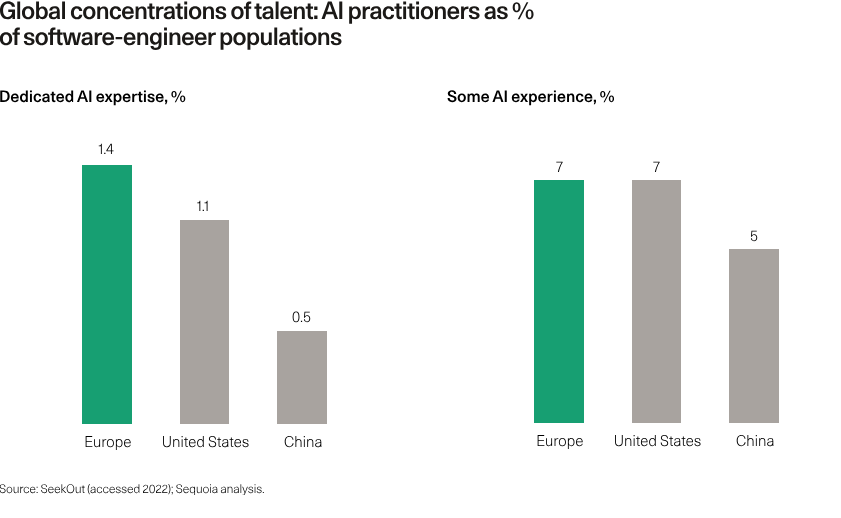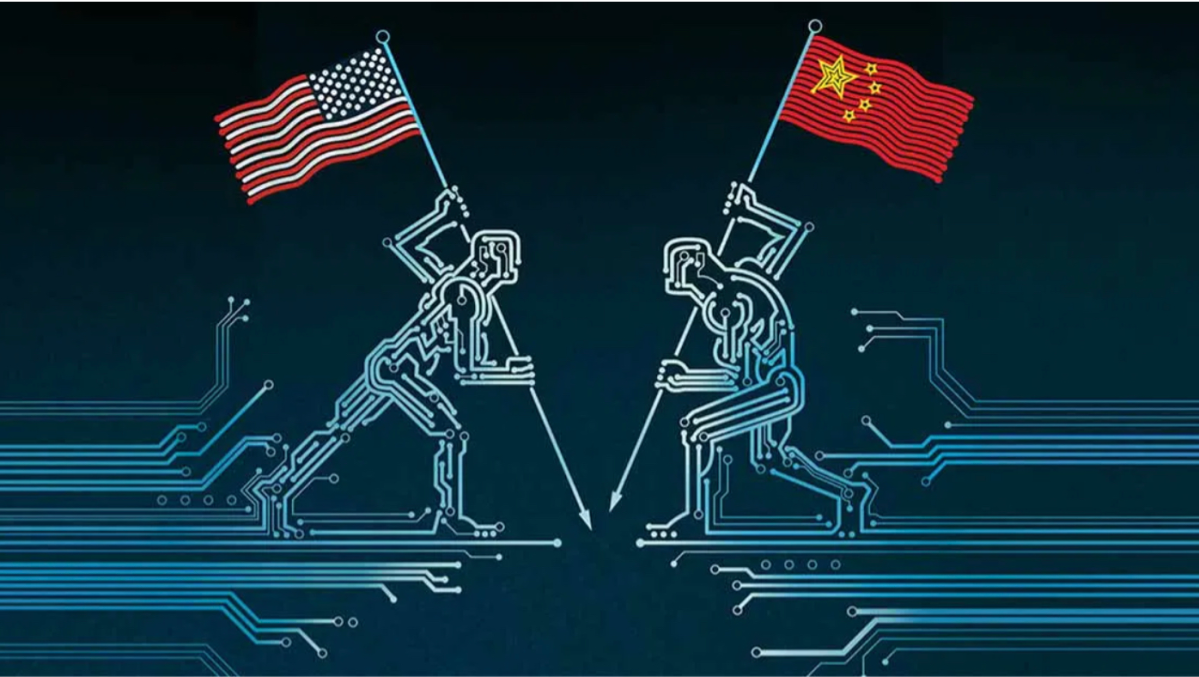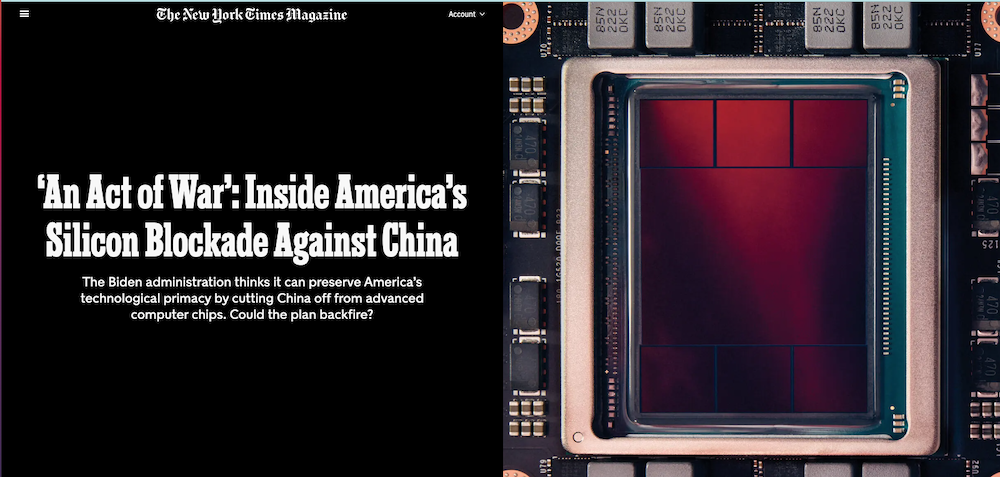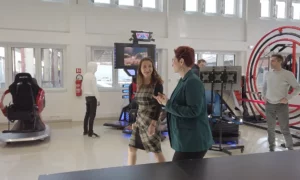(Editor’s note: This post on tech wars is part of Dispatches’ Tech Tuesdays series. We cover tech because so many of our highly skilled internationals are engineers and physicists.)
Globally, there are four wars of tech domination brewing – artificial intelligence, photonics, energy transition and next-gen computer chips. Here are the tech wars Europe – and Eindhoven – can win.
A recent Sequoia Capital report finds that Europe has a higher concentration of AI-focused software engineers than the United States or China at a time when adoption is increasing across every industry. It’s not a coincidence that the EU has spent billions of euros to build the ecosystem. Of course, the distribution of talent is non-linear, with winners and losers in this crucial skirmish in the tech wars.
The report by the Silicon Valley-based VC finds that while there are tens of thousands of engineers involved in AI, there are only 43,000 “dedicated practitioners” driving Europe’s AI revolution. We say “only,” because there are almost that many engineers at the various semiconductor companies just in Eindhoven, including ASML and NXP.

Here’s why Europe could actually own AI innovation down the line, from the post:
Europe’s software-engineering talent pool includes a per-capita concentration of AI experts 30-percent higher than in the U.S. and almost three times as high as in China (Figure 1 above). This is an unusually educated and experienced group. Seven in ten have a master’s degree or PhD and slightly more have over a decade of experience – well above the figures for engineers as a whole.
At this early point, Dublin is the clear winner, according to the VC, hosting AI centers for Google, Meta and Microsoft. But there’s good news for Eindhoven in the report, which notes that many AI talents realize they don’t need Google but can jump into a startup or found their own. Right, Fabrizio Del Maffeo? AI companies in Europe have also seen strong exit activity – in Q1 of this year, Europe led among global regions in its share of AI exits, with 38 percent.
The report is brief and too the point … and a must-read.
China vs US in the tech wars
Once again, ASML and Eindhoven are squeezed between the two tech behemoths, China and the United States, in an increasingly dangerous world. American officials are saying out loud they intend to completely cut off China from the most advanced chipmaking technology, and, of course, that means ASML. And sources tell us that ASML CEO Peter Wennink recently met with President Biden as the tech wars heat up.
In a NYTimes Sunday Magazine post, an analyst at Evercore ISI, the global banking consultancy, says the situation has gone beyond competition to provocation:
C.J. Muse, a senior semiconductor analyst at Evercore ISI, put it this way: “If you’d told me about these rules five years ago, I would’ve told you that’s an act of war – we’d have to be at war.”
The post by Alex W. Palmer notes that only a small handful of companies can compete at the cutting edge of chip technology, “where breakthroughs cost billions of dollars and decades of research.” That’s Palmer’s lead-in to the section detailing how it took ASML years and years to develop their most revolutionary extreme ultra violet machine – the most complex machine humans have yet produced. And a machine that – if the American policymakers have their way – the Chinese will never, ever get their hands on as they increasingly threaten war with Taiwan. Because Taiwan is the home of the world’s largest chipmaker, TSMC.
In war and business, the country with the best computers wins. And the country that can’t get American (and Dutch) technology is screwed.
So, Americans increasingly are weaponizing export bans. “At every step,” the supply chain runs through the U.S., U.S. allies or Taiwan, all of them operating in a U.S.-dominated ecosystem, according to the post.
Bloomberg has a post about the latest restrictions.
As an aside, we can tell the Chinese know they’re not winning by the way Chinese propagandists spend so much effort spinning the chip wars into a “we’re already dominating photolithography and chips” narrative on Youtube and other social media platforms.
They’re not.
SMART Photonics gets a super-sized loan
A bit lost in the headlines about AI and ASML, photonics is really just emerging as the future of computing, along with quantum computing, and the two are related. Just don’t ask us to explain how. (For that, we’d have to have physicist and inPhocal founder Martijn Boerkamp whispering in our ears.) What we do know is that High Tech Campus Eindhoven-based SMART Photonics, which makes photonic integrated circuits, just landed 100 million euros to build a new fab, another salvo in the tech wars.
The capital includes 60 million euros from the Netherlands’ 20 billion euro National Growth Fund, the photonics-dedicated Deep Tech Fund and from PhotonDelta (part of Invest-NL and partly funded by the Dutch ministry of Economic Affairs) and 40 million from Dutch industry giants, including ASML and NXP, as well as ASML supplier VDL Groep and ING Group bank.
But this caught our eye – the deal is structured through (we’re guessing here) some flavor of debt, either convertible loans or senior-secured debt, and not equity. For established tech companies – SMART Photonics was founded in 2012 – this is fairly rare. Just why neither the private sector nor the public sector chose a more conventional equity deal, nobody is saying.
The Financieele Dagblad speculates that this is a debt, not equity, deal so as not to distort SMART Photonics’ capitalization table in the event of an IPO. Which makes no sense to us. The whole idea of an equity investment is to cash out when a startup/scale-up goes public. That said, if SMART Photonics is building a fab, they’re about 900 million short and are going to need to raise additional rounds of funding. If that’s the case, debt is irrelevant and – as FD points out – SMART Photonics forgoes the valuation that VCs would have assigned as they negotiated what percentage of the company they’d get for their 100 million.
That valuation could have complicated future fundraising, resulting in a down-round that would cost the founders and principals even more equity.
A personal note here: We ran into the very chill Johan Feenstra recently at the Deep Tech Connect event at High Tech Campus Eindhoven and we forget he’s like da OG in photonics.
By the way, a photonic integrated circuit works by using photons – light particles, or a quantum of the electromagnetic spectrum – rather than electrons in a circuit to transfer, sense, process and transmit information, working in tandem with a conventional microcircuit on a silicon chip. Or something like that.
Quick hits:
• This is cool, and we don’t really know how this works, either. The Conference Center at High Tech Campus Eindhoven now has Li-fi in some of the meeting spaces. This is essentially broadband Internet delivered through light waves (photons) which are, as we pointed out above, quanta of the electromagnetic spectrum, rather than radio waves like WiFi. This technology, like so many innovations, came out of Eindhoven, Philips Lighting (now Signify) to be exact. Will Li-Fi replace WiFi? Unlikely, but it’s better than WiFi in places such as hospitals where radio waves can interfere with equipment or where WiFi signals can’t reach or are weak.
• Venture builder HighTechXL and economic-development agency BOM are developing a new program to place redundant tech talent into healthtech and medtech startups. We’re not cleared to reveal details, but some of the Dutch media are onto the initiative, so look for this to go public sooner rather than later. If you’re interested in becoming a co-founder of a healthcare or medtech venture, contact HighTechXL: [email protected]
Look for a lot more churn among Eindhoven’s top tech companies as Philips cuts its workforce. Financieele Dagblad has a post today, 19 July, about 100 researchers leaving Philips for ASML.
• Good news on the housing front. As many as 550 temporary could be built at the Flight Forum next to Eindhoven Airport. The housing would be for PhD candidates and students.
• Well have more on this, but Victor Donker and Jori Verbeek at Usono, a HighTechXL alumnus, are making headlines with new partnerships.
Clarius Mobile Health, a leading provider of high-definition handheld ultrasound systems, and Usono, a developer of innovative ultrasound accessories, joined forces at the ECSS Paris 2023 Congress to introduce a wireless and wearable ultrasound imaging solution for researchers studying the anatomy of people while they move. Which no one has been able to do before.















